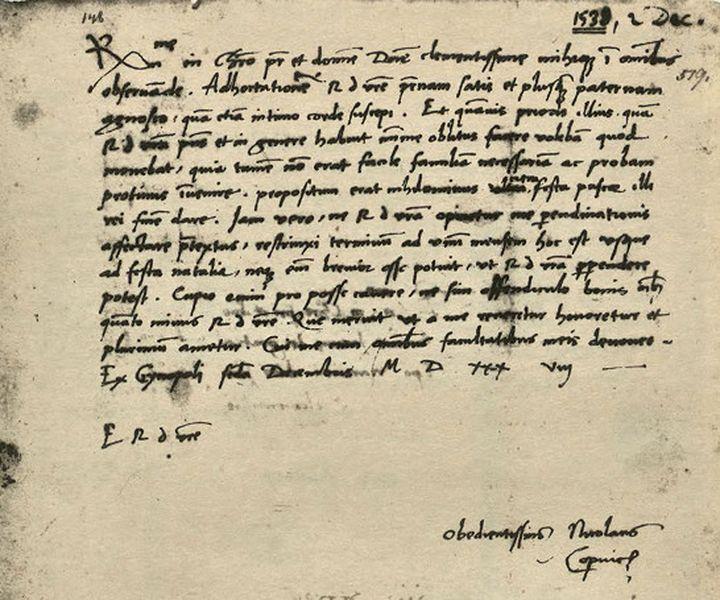Little is known about the private life of Nicolaus Copernicus until he reached an age sufficiently mature for it to be difficult to suspect him of promiscuity. Before the year 1538, a mysterious woman appeared in his life who was the source of several interventions by Bishop Dantyszek (Dantiscus). He rebuked the old astronomer and requested the dismissal of the "housekeeper" from his see. Her name was Anna Schilling.
Previously she was regarded as the daughter of Matthias Schilling, a known minter who ran a mint in Toruń (1529–1535), and later in Gdańsk (1535–1540). However, there is no evidence concerning any relationships of Copernicus with Schilling and his family. There was a relative of the astronomer - Anna Krüger who, in 1515, married Arend von den Schellings, a merchant from Gdańsk. She was a daughter of Heinrich Krüger, mayor of Toruń (1504) and Christine von Allen, the daughter of Tileman and a cousin of Copernicus. The astronomer repeatedly visited Gdańsk and maintained close relations with his cousins living in that city. He had special relations/ties with the Feldsteds, as was mentioned before, and with the Schellings.
Together with Arend, the husband of Anna, he was a co-carer of the Feldsted widow and her children. According to family tradition, the previously mentioned Arend was to die in 1537, so very close to the events of interest to us, and his wife Anna was to die soon after in 1538. Both of these dates are uncertain. They are not confirmed by the information from the oldest register of deaths from St. Mary parish in Gdańsk, started in the same year 1537. Arend might have left the city, disappeared without trace, or in fact died in 1537.
In either case it would have been justifiable that Anna was looking for help from her wealthy uncle. The most probable solution to the riddle is to assume that Anna lived on and it was she who – as the closest relative of Copernicus – stayed in his household in Frombork in 1538 and 1539. In his response to the second "fatherly admonition" by Bishop Dantyszek of 2nd December 1538, demanding the dismissal of the housekeeper, Copernicus wrote that he treated it with due seriousness, but it was difficult to find quickly an honest housekeeper who was a relative. The argument in favour of the identity of Anna von der Schellings and Anna Schilling is the fact that after moving from Copernicus’ household in March 1539, the woman, who was dear to Copernicus, sent her things to Gdańsk, so this is where she came from.
Anna returned to Gdańsk probably as early as 1539. After the astronomer’s death she once more visited Frombork, where she sold a house she owned. In any event, it must be recognized that Anna treated Copernicus as her closest relative. He was her great uncle. Upon arrival at Frombork, in 1537 or 1538, she was 47 or 48 years old, so she was about 15 years younger than the astronomer. Anna was a rich woman, and this could have been the reason for the envy of the canons, hostile to Copernicus, and of Bishop Dantyszek. It is possible that the astronomer became a victim of another conflict taking place at this time, namely one between the Bishop and a friend of the aged canon Aleksander Sculteti.
Both were interested in cartography – Sculteti was preparing a map of Livonia and took advice from an older friend from the chapter. While in Livonia (where he was a Dorpat canon) he had been under the influence of Lutheran preachers. Nevertheless, he did not give up his duties in the chapter, but he did also establish a permanent relationship with Miss Suchten from Gdańsk, whom he brought to Frombork. The Bishop may not have been as much appalled by the fact that Sculteti had sexual intercourse with a woman as by the fact that he officially resided with her in his see in Frombork. This conflict backfired on Copernicus. Sculteti ultimately did not succumb to the pressures of the Bishop, but converted to Lutheranism and married his life companion. It is also worth noting that Bishop Dantyszek, before becoming a priest, had been famous for his amorous disposition, and was later a caring father. He took care of his illegitimate daughter, born in faraway Spain, until she married a man proper to her background.
The astronomer remained under the attentive watch of the Bishop until the end of his days. Dantyszek admonished him personally twice – in September and October of 1538, then in January 1539. However, he did not stop at that. He wrote a letter to ask for intervention in this matter to the sick canon Felix Reich, and then to Tiedeman Giese who was Copernicus’ host in Lubawa in April and May, and then from June to September 1539. Whether the relationship between Anna Schilling and her relative was only a profound friendship or something else, remains a mystery.
Bibliography
- Mikulski, Nicolaus Copernicus. Life and work, Toruń 2009.
- Repheck, Copernicus’ secret: how the scientfic revolution began, New York 2007.
- Sikorski, Prywatne życie Mikołaja Kopernika, Olsztyn 1973.
- Wasiutyński, Kopernik – twórca nowego nieba, Warszawa 1938.
 English (United Kingdom)
English (United Kingdom)  Polski (PL)
Polski (PL) 






